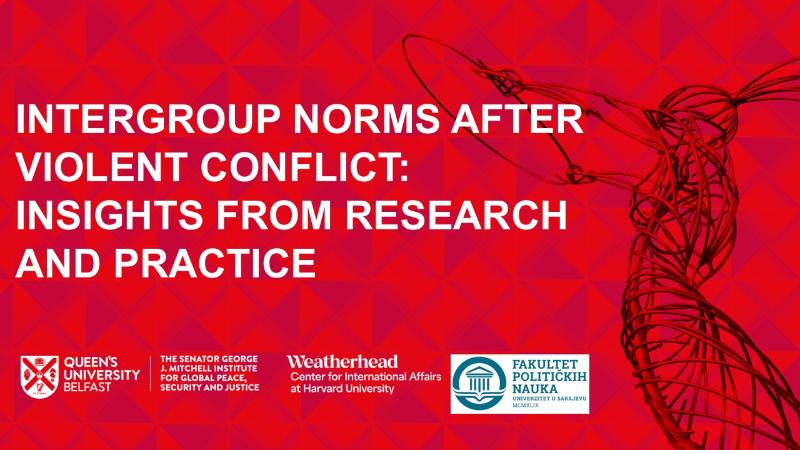- Date(s)
- September 19, 2025 - September 20, 2025
- Location
- University of Sarajevo, Faculty of Political Science; Skenderija 72, 71000 Sarajevo
- Time
- 13:00 - 22:00
- Price
- Free
This Conference brings together researchers and practitioners who study, design, and/or implement interventions to improve interethnic norms after violent conflict and who seek to understand the origins and effects of intergroup norms. Social norms, or “shared understandings about actions that are obligatory, permitted, or forbidden,”[1] offer a conceptual lens for understanding patterns of behavior across diverse fields of research and disciplines. Intergroup norms are particularly important after episodes of violent conflict. In many post-war settings, although peace agreements have brought a halt to physical violence, intergroup norms frequently inhibit intergroup contact and cooperation, perpetuate intergroup polarization, and limit the prospects for peacebuilding. Practitioners have thus identified changing social norms as a key strategy for preventing violence.[2] Yet many interventions to foster contact and cooperation among members of hostile groups lead to limited and ephemeral improvements; shifting underlying social norms is an enduring and critical challenge.
This Conference innovatively explores the patterns, causes, and consequences of intergroup norms after violent conflict by fostering exchanges between scholars and practitioners who study and implement interventions to affect intergroup norms in diverse contexts.
In the wake of “ethnic” violence and war, what factors affect intergroup norms of interaction, and what are the consequences of these intergroup norms?
How do norms of intergroup interaction emerge, and why do they change or remain durable over time?
What are the political, social, and economic characteristics of localities where intergroup norms of contact, cooperation, and toleration are more likely to emerge and interventions to promote such norms are more successful?
Which individual-level or societal-level interventions most effectively change intergroup norms?
When do electoral and political institutions provide stable foundations for inculcating norms of power-sharing among competing ethnic groups?
Who should establish intergroup norms in post-conflict settings in areas of contested state legitimacy?
How do intergroup norms affect outcomes such as intergroup discrimination, economic and social cooperation, and the likelihood of violence, and how can these norms be transformed in the interest of intergroup toleration, social cohesion, and peacebuilding?
This Conference will cover themes related to intergroup norms after violent conflict at different levels of analysis: the micro-, meso-, and macro-levels. Panels will focus on theoretical insights into the causes and consequences of intergroup norms, the conditions under which elites construct norms of cooperation and toleration, the role of peacebuilding networks and civil society groups in working with influential actors to improve intergroup norms, and the influence of macro-level national and international actors and institutions on intergroup norms after violent conflict. Each panel will include a mix of scholars and practitioners.
[1] Elinor Ostrom. “Collective Action and the Evolution of Social Norms.” Journal of Economic Perspectives 14, no. 3 (Summer 2000): 137-158.
[2] See, for example, the World Health Organization’s report, Changing Cultural and Social Norms that Support Violence (2010).
View the Conference Programme here
Register here.
This event is sponsored by:
The Senator George J. Mitchell Institute for Global Peace, Security and Justice (Queen’s University Belfast)
The Weatherhead Research Cluster on Identity Politics, Weatherhead Center for International Affairs (Harvard University)
Faculty of Political Science (University of Sarajevo)
With support from the Carnegie Corporation of New York
